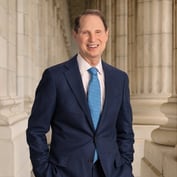What You Need to Know
- Warren talked about reporting rules at a Senate Finance hearing on tax avoidance.
- Her account balance report proposal would apply both to banks and to other financial institutions.
- A former IRS commissioner said wealthy taxpayers report only half of income that is not subject to third-party requirements.
Sen. Elizabeth Warren wants banks and other financial institutions to send customer account balance reports to the IRS.
The Massachusetts Democrat said Tuesday that an account balance reporting provision will be part of a tax enforcement bill she is drafting.
The bill will include the new third-party account balance reporting section along with sections that would increase funding for IRS enforcement efforts, Warren said.
Warren talked about the bill during a hearing the Senate Finance Committee held to look at the effects of tax compliance gaps on federal income tax revenue.
The Tax Gap
The United States will get about $2.2 trillion of its $3.9 trillion in 2021 revenue from individual and corporate income taxes.
Sen. Sheldon Whitehouse, D-R.I., the Senate Finance chairman, said the “tax gap,” or the difference between what taxpayers owe and the amount they pay each year in a voluntary and timely fashion, may have grown as high as $1 trillion in recent years.
“That’s trillion with a T,” Whitehouse said.
Wealthy individuals and corporations may reduce their tax payments by $40 billion to $123 billion per year by hiding money offshore, Whitehouse said.
J. Russell George, the Treasury inspector general for tax administration (TIGTA), testified at the Senate Finance hearing that TIGTA believes that self-employed workers who get paid through online platforms are also underreporting income, and that the rise of “virtual currencies,” or “cryptocurrencies,” such as Bitcoin and Ethereum, is also causing problems.
“We found that it is difficult for the IRS to identify taxpayers with virtual currency transactions because of the lack of third-party information reporting,” George said.
The 1099NEW Proposal
Charles Rossotti, who served as the IRS commissioner from 1997 through 2002 and who is now affiliated with Shrink the Tax Gap Inc., a nonprofit group, said he believes the IRS could recover about $140 billion of the lost tax revenue per year, with all of the gain coming from the top 25% of taxpayers and a majority coming from the top 3%.
One important way to improve compliance would be to increase third-party reporting requirements by introducing a new reporting form, Rossotti said.
“Where income is reported and easily checked by W-2’s and 1099s, compliance is 99%,” Rossotti said. “Where income is not reported, compliance is as low as 50%.”
In written testimony, Rossotti suggested that the IRS should add a 1099NEW reporting form that would be filed by banks, other traditional financial institutions, online payment systems, mobile payment app services providers and cryptocurrency exchanges.
The financial services providers would use 1099NEW to report on “accounts held by taxpayers with low visibility income” who have relatively high levels of income, according to Shrink the Gap’s 1099NEW proposal.
A 1099NEW form would show total annual deposits and withdrawals from each of the taxpayer’s accounts over the course of a calendar year, according to the proposal.
Taxpayers would then reconcile the information from the 1099NEW forms with the forms they use to report their gross business income, business deductions, net results and capital gains.
Capital Gains Reporting
Warren talked about the idea of third-party reporting gaps in an exchange with Rossotti.
She asked him what would happen if a taxpayer owned a giant beachfront mansion and generated substantial capital gains income by selling it.
“Is the IRS likely to know exactly how much income you received?” Warren asked Rossotti. “Well, of course, you’re required to report it as a capital gain, but there isn’t any third-party reporting on that kind of a transaction.”
Similarly, Rossotti said, a mansion owner who rented it out through Craigslist would have an obligation to report the rental income to the IRS, but would not interact with any third parties with an obligation to send information about the rental payment income to the IRS.
“The conclusion we can derive is strengthening third-party information reporting would obviously help people file their taxes more easily and more accurately and frankly make it harder for wealthy tax cheats to get away with hiding their income,” Warren said.
Sen. Elizabeth Warren, D-Mass. (Photo: Bloomberg)







 May 12, 2021 at 11:58 AM
May 12, 2021 at 11:58 AM














 Slideshow
Slideshow





